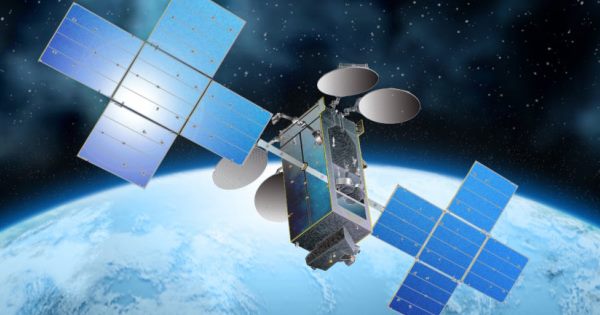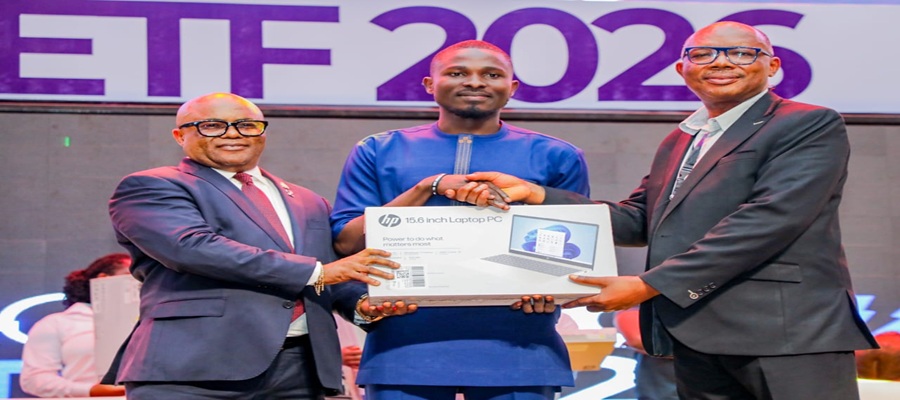Telecom
Grace Sustaining Nigeria’s Satellite in Orbit- NASRDA

Halilu Shaba, director-general, National Space Research and Development Agency (NASRDA), has said that Nigeria’s satellite expired 3 years ago but still functioning by ”grace”.

This is coming after a similar revelation by Space in Africa, that NigeriaSat-1, NigComSat-1, and EduSat-1 – three Nigerian satellites are no longer in orbit.
But speaking in an interview on Channels Television, Shaba, said the satellite expired in 2018 and that Nigeria has only one satellite and that it is not enough to serve the country and is only gibing necessary data based on ‘Grace’
Shaba said the satellite was installed in 2011 and should have been changed because it has a seven-year life span.
“We have only one satellite (built in 2011). It has a seven-year life span and the life span is supposed to have expired in 2018. In our culture of satellite industries, you build a new satellite that is supposed to have replaced that one before you; we have not done that,” Shaba said.
“We are living on grace because normally based on the fuel of the satellite, you imagine that it is going to last for seven years but since 2018, the satellite has been functional and it is still giving us the necessary data.”
Shaba said though having more than one satellites and changing the old one is a priority, the country’s dwindling resources have made it difficult to achieve that.
Only recently, Space in Africa which produces authoritative business and market analysis reports for the African Space and Satellite Industry segments, reported that NigeriaSat-1, NigComSat-1, and EduSat-1 – three Nigerian satellite are no longer in orbit.
Space in Africa reported that only NigComSat-1R, a communications satellite, NigeriaSat-2 and NigeriaSat-X, an Earth observation satellites, are still active.
The report “Replacing Nigerian Satellite Gone Past Design Life; The Journey So Far” authored by Mustapha Iderawumi , said that “Nigeria’s first satellite, NigeriaSat-1, was launched on September 27, 2003, and on August 17, 2011, a replacement, NigeriaSat-2, the most powerful imaging spacecraft ever sent into orbit , was launched.”
The report went on the say that an equivalent satellite, NigeriaSat-X, was co-launched with NigeriaSat-2 at the Yasny military base in Russia
On May 13, 2007, the country’s and Africa’s first communications satellite, NigComsat-1, was launched at an overall cost of USD 300 million. It de-orbited on November 11, 2008, and a replacement, NigComsat-1R, was launched on December 19, 2011.
The cost of both satellites was USD 48.4 million, including launch and insurance. NigeriaSat-1, a satellite built exclusively by the Federal University of Technology Akure, cost the country USD 13 million.
Both NigeriaSat-2 and NigeriaSat-X have a design life of seven years.
In 2014, six years after it has outlived its design life, NigeriaSat-1 was decommissioned by engineers and scientists of the NASRDA, burning up in a controlled re-entry into Earth’s atmosphere.
Nigeria’s EduSat-1 was launched on 3 June 2017. The entire cost of the project, including building and launch, was USD 500,000. EduSat-1 de-orbited on 13 May 2019.
Of Nigeria’s six satellites: NigeriaSat-1, NigComSat-1, and EduSat-1 are no longer in orbit. That leaves three active satellites: NigComSat-1R, a communications satellite, NigeriaSat-2 and NigeriaSat-X, an Earth observation satellites.
The design life of NigeriaSat-2 and NigeriaSat-X ended in 2018, although they are still in orbit and working, but not optimally. The design life of NigComSat-1R will end in 2025.
Nigeria plans for NigeriaSat-3 and NigeriaSAR-1 to replace the two Earth observation satellites, NigeriaSat-2 and NigeriaSat-X, that have outlived their design lives.
Telecom
Samsung Unveils Galaxy S26 Series, Powered by Smarter, Background AI

Samsung Electronics Co., Ltd. Wednesday announced the Galaxy S26 series, powered by the most proactive and adaptive Galaxy AI experiences yet and designed to simplify the tasks people do on their phones every day.

Samsung
From managing plans and finding information to capturing and refining content, Galaxy S26 reduces the effort and number of steps required to get things done.
As Samsung’s third-generation AI phones, Galaxy S26, S26+ and S26 Ultra handle complex tasks in the background, allowing users to focus on results rather than how the technology works.
The Galaxy S26 series was engineered with Samsung’s most advanced capabilities working together as one: incredible performance, an intuitive camera system and Galaxy AI.
This provides a strong foundation that gives Galaxy S26 users the confidence to depend on their phone throughout the day without compromising security or privacy.
Building on Samsung’s decades of innovation in display technology, Galaxy S26 Ultra introduces the industry’s first built-in Privacy Display for mobile phones to unlock a new class of display experiences and reinforce Samsung’s commitment to privacy at a pixel level. Galaxy S26 Ultra also delivers a customized chipset and upgraded thermal management that enable faster and more powerful AI, all wrapped up in the slimmest Ultra yet.
Together, these choices allow the Galaxy S26 series to deliver the most powerful Galaxy experience yet.
Engineered for all-day performance, the Galaxy S26 series is built on the most powerful hardware ever on a Galaxy S series, powered by a customized chipset.
Across the line-up, the Galaxy S26 series is engineered for AI performance, power efficiency and thermal management, ensuring demanding tasks run smoothly and consistently, so users can rely on their device when it matters.
On Galaxy S26 Ultra, a customized mobile processor, Snapdragon 8 Elite Gen 5 Mobile Platform for Galaxy, delivers the best performance ever in its class with significant gains across CPU, GPU, and NPU to support faster, smoother experiences that keep up throughout the day.
A CPU performance increase of up to 19% means Galaxy S26 Ultra responds more quickly and handle complex workloads intelligently, even when multiple tasks are running at once.
A 39% improvement in NPU performance powers always-on Galaxy AI features that run seamlessly, allowing users to move between tasks without lag or interruption.
A 24% boost in GPU performance delivers richer visuals and more fluid gameplay. To support all-day use, Galaxy S26 Ultra also brings Super-Fast Charging 3.0, minimizing downtime by reaching up to 75% charge in just 30 minutes.
Taken together, these advancements deliver dependable all-day performance, making every action feel effortless.
Galaxy’s Best Camera System Yet
The Galaxy S26 series brings the same focus on intuitive interaction to creativity and productivity, delivered through the best Galaxy camera system ever. With an approach that integrates content capture, editing and sharing into a single, seamless experience, creativity feels more natural and accessible even without professional tools or technical knowledge.
On Galaxy S26 Ultra, wider camera apertures allow more light to reach the sensor, delivering clearer photos with richer details in low-light conditions, even when zoomed in.
Enhanced Nightography Video keeps footage clearer and more vibrant even in dim scenes, whether capturing concerts indoors or recording moments around a campfire after sunset.
Video capture is further enhanced with upgraded Super Steady capabilities, which add a horizontal lock option for greater stability and to make consistent framing easier to achieve, even with bumpy trails or fast-paced activities.
Galaxy S26 Ultra is the first Galaxy device to support APV, a new professional-grade video codec designed to deliver efficient compression for high-quality production workflows. Optimized for advanced creators, it ensures visually lossless video quality that stays true even after repeated editing.
Improvements to the AI ISP now extend to the selfie camera, capturing more natural skin tones and finer detail in mixed lighting.
Galaxy S26 Ultra is the first Galaxy device to support APV, a new professional video standard and codec designed to deliver efficient compression for high-quality production workflows. For creators who care about quality, this means visually lossless video quality that stays true even after repeated editing.
Editing photos and videos is just as easy and straightforward, with AI-powered tools built into familiar workflows so users can make changes quickly and unlock their creativity without design expertise.
With the upgraded Photo Assist suite, users can simply describe what they want to change in their own words.
Changing the scene from day to night is just a matter of asking. It can also add to images and restore missing parts of objects like a bite taken out of a cake. Personal details, such as a spill on clothing, can also be cleaned up with Galaxy AI’s new ability to change outfits in photos. Edits can now be made continuously, reviewed step by step, and easily adjusted or undone along the way, making the process feel fluid rather than final.
Creative Studio builds on this simplicity by bringing creation and customization into one integrated space, making it easy to act on ideas when inspiration strikes. Starting from a sketch, photo or prompt, users can quickly turn ideas into polished visuals, from stickers and invitations to personalized wallpapers, and refine or share them without switching tools or interrupting creative flow.
The Galaxy S26 series also simplifies frequent visual tasks with AI-powered tools like the Document Scanner, which removes distortions and distractions such as creases or fingers to deliver clean scans instantly. Multiple images can be organized automatically into a single PDF, making it easy to digitize receipts, forms or notes.
Everyday Ease With Proactive And Adaptive Galaxy AI
The Galaxy S26 series is designed to make frequently used experiences feel straightforward and user-friendly, with Galaxy AI reducing the steps between intent and action. It works more proactively and seamlessly on the user’s behalf based on context, surfacing the right support at the right moment and automating tasks with minimal manual input. As the technology fades and handles tasks in the background, users can focus on the results.
The Galaxy S26 series integrates a choice of agents, including Bixby, Gemini and Perplexity. Once set up, tasks can be completed with a single button press or voice prompt.
The series features an upgraded Bixby as a conversational device agent, making it easier than ever to interact with Galaxy devices. Galaxy S26 can also handle multi-step tasks in the background, streamlining the process on the user’s behalf.
For example, with Gemini, booking a taxi is as simple as asking, reviewing the details and tapping confirm.
These assistants support tasks such as searching, coordinating actions across apps, and controlling device settings through natural interaction.
Layers of Protection in the Age of AI
As mobile experiences become more personalized thanks to AI, protecting user privacy becomes even more critical. Samsung builds protection into every layer of Galaxy S26, keeping personal data secure while giving users transparency and control over how their information is used.
Galaxy S26 Ultra introduces privacy at the pixel level with the mobile industry’s first built-in Privacy Display, a breakthrough in display technology that fundamentally changes how privacy can be protected on a phone.
Designed for everyday situations like transit, cafés and shared environments, Privacy Display goes beyond anything previously available on mobile devices, hardware and software working as one to protect privacy without compromising the viewing experience.
By controlling how pixels disperse light, the display keeps content clear, bright and comfortable for the user in everyday use, while limiting what others can see.
Unlike traditional stick-on privacy films, Galaxy’s integrated Privacy Display preserves full viewing quality from all directions when off, and limits visibility for others from side viewing angles when activated, even when switching between portrait and landscape orientation.
Users can customize when it turns on, such as when entering PINs and passwords or opening selected apps, and adjust privacy levels depending on the situation. Partial Screen Privacy intelligently limits visibility for notification pop-ups, while Maximum Privacy Protection further obscures side views for added discretion, all with minimal impact on power or usability.
The Galaxy S26 series also brings smarter software safeguards that work quietly in the background. AI-powered Call Screening identifies unknown callers and summarizes intent, making it easier to safely manage calls. Privacy Alerts use machine learning to proactively notify users in real time when apps with device admin privileges unnecessarily attempt to access sensitive data, such as precise location, call logs or contacts. These alerts help users quickly understand when apps are seeking deeper access, so they can manage permissions with greater clarity and control.
Private Album, built directly into Gallery, lets users easily hide selected photos and videos without creating a separate folder or signing into a Samsung Account. To stay ahead of emerging threats, Galaxy S26 also extends Samsung’s innovation in post-quantum cryptography (PQC) to critical system processes, including software verification and firmware protection, strengthening device integrity for the future.
New updates to Knox Matrix further strengthen protection across connected Galaxy devices, adding PQC-enabled end-to-end encryption for direct transfers like eSIM migrations and clearer visibility into firmware update status across the ecosystem through Security Status of Your Devices.
Galaxy S26’s ease of use continues even when the phone is out of reach. The new Galaxy Buds4 series is a natural companion to Galaxy S26, extending everyday experiences beyond the phone while delivering rich and immersive hi-fi sound.
When Galaxy S26 is paired with Galaxy Buds4, interactions can continue naturally in moments when using hands isn’t practical.
Users can activate AI agents with their voices, manage calls through simple Head Gestures on Buds4 Pro, and stay connected without breaking their flow.
Availability
Galaxy S26 Ultra, S26+ and S26 will be available for pre-order starting from February 25. The Galaxy S26 series features a unified design language across all models, with shared color options including Cobalt Violet, White, Black and Sky Blue alongside the Samsung.com-exclusive Pink Gold and Silver Shadow.
For added peace of mind, Samsung Care+ offers comprehensive coverage optimized to users’ device needs, including fast repairs for accidental damage, extended warranty, and certified expert support available both at home and abroad.
This ensures a seamless mobile lifestyle and provides lasting protection that safeguards the value of Galaxy devices.
Telecom
NITDA Empowers 50 Enugu Youths with Digital Tools, Hails Mbah’s Support

In a significant step toward deepening digital inclusion in Enugu State, the National Information Technology Development Agency (NITDA) has empowered 50 young innovators with digital tools, while commending Governor Peter Mbah for his pivotal support of the Agency’s South-East Zonal Office.

NITDA
Delivering the goodwill message at the event, NITDA Director General Kashifu Inuwa, represented by Dr. Aristotle Onumo, Director of Stakeholders Management and Partnerships, described the Governor’s commitment as instrumental to the successful launch and rapid performance of the Zonal Office, now recognised as one of NITDA’s top-performing offices nationwide.
“Inuwa noted that Enugu, historically known as Nigeria’s coal city, is undergoing a transition from natural-resource reliance to a knowledge-driven economy. ‘Enugu was once an energy capital powering industries from beneath the earth. Today, the energy driving Enugu is the creativity, talent, and determination of its young people,’” the DG’s message read.
Highlighting the role of digital technology in global economic growth, Inuwa cited projections that the digital economy could contribute up to $23 trillion to global GDP in the coming years, stressing that investment in digital skills today will shape national prosperity tomorrow.
As part of the initiative, over 900 youths registered on NITDA’s digital training platform, with 50 outstanding participants receiving digital tools to enhance their skills and foster innovation. Additionally, 250 participants were recognised for their dedication and excellence throughout the training.
“Nigeria must not only consume technology but create it. Innovation must become our currency, and digital skills must become the bridge to opportunity,” Inuwa emphasised, noting NITDA’s goal of achieving 70 percent digital literacy among Nigerians by 2027.
The initiative aligns with the Agency’s broader strategy to shift the nation from a resource-based economy to a knowledge-based economy driven by innovation, entrepreneurship, and technology.
Governor Peter Mbah, in his remarks, described the festival as more than a technology conference, calling it “a reinforcement of intent” and a validation of the state’s ambition to become a credible node in Nigeria’s growing innovation ecosystem.
Drawing a comparison between Enugu’s historic coal industry and its emerging digital future, he observed that while coal once powered industries across Europe and West Africa, the economic benefits largely left the state.
Today, he argued, Enugu’s greatest resource is its people—their creativity, skills, and innovative potential.
By investing in technology, education, and digital infrastructure, Mbah envisions a future where the state harnesses local talent to generate value, turning ideas into globally competitive solutions and establishing Enugu as a hub of knowledge and digital innovation.
Referencing global technology giants such as Apple, Microsoft, Amazon, Meta, and Tesla, he stressed that control over digital infrastructure is the key to economic leverage in the 21st century.
“Find what is broken, understand it deeply, and fix it properly,” he advised, underscoring that innovation is not about glamour but solving real problems.
He highlighted Enugu’s progress in embedding artificial intelligence in security operations, digitising core government functions, and introducing Geographic Information Systems in land administration to enhance efficiency and strengthen land rights.
Earlier, Dr. Prince Lawrence Ezeh, Enugu State Commissioner for Innovation, Science, and Technology, delivered the welcoming address, highlighting the progress made since the inaugural edition of the festival.
He noted that thousands of youths have been trained through digital skills initiatives, strategic partnerships have been launched—including Nigeria’s largest tech hub initiative—and technology clusters in blockchain and gaming have expanded, positioning Enugu as an emerging national tech leader.
Dr. Ezeh outlined the core objectives of ETF 2026: transforming businesses through innovative strategies aligned with the digital economy, and strengthening communities by fostering collaboration and resilience.
He also revealed ongoing reforms to embed technology across governance and public services, including advanced real-time security systems, smart green schools, and modernised public service platforms.
Other dignitaries in attendance included Anna Vesterholm, Ambassador of Sweden to Nigeria; Aminu Maida, Executive Vice Chairman of the Nigerian Communications Commission; alongside captains of industry and leading technology experts.
Telecom
Sophos Report: Identity Attacks Drive 67% of Cyber Incidents as Threat Groups Surge in 2025

Sophos, a global leader of innovative security solutions for defeating cyberattacks, today released the 2026 Sophos Active Adversary Report.

John Shier
It reveals that 67% of all incidents investigated by Sophos Incident Response (IR) and Managed Detection and Response (MDR) teams last year were rooted in identity-related attacks.
The findings highlight how attackers continue to exploit compromised credentials, weak or missing multifactor authentication (MFA), and poorly protected identity systems, often without needing to deploy new tools or techniques.
Key findings include:
- A shift from exploited vulnerabilities toward compromised credentials, with brute-force activity (15.6%) drawing almost level with exploitation (16%) as an initial access method
- Median dwell time declined to three days. This was driven by attackers’ movements, but also by defenders reacting more swiftly. This was particularly notable in MDR environments.
- Attackers are getting faster at reaching Active Directory (AD). Once an attacker is inside an organization it takes them just 3.4 hours to get to the AD server.
· Ransomware remains a firmly off-hours activity. 88% of ransomware payloads are deployed out of hours, and 79% of data exfiltration actions take place out of hours, emphasising the continued need for 24/7 coverage.
- Lack of telemetry undermines defense efforts. Missing logs due to data retention issues doubled over last year. This rise was largely driven by firewall appliances where the default was only seven days, and in some cases, 24 hours.
Identity Attacks Accelerate While MFA Gaps Persist
The report shows a continued rise in attacks rooted in identity compromise, including stolen credentials, brute-force activity, and phishing.
While exploited vulnerabilities remain a factor, attackers increasingly rely on valid accounts to gain initial access, allowing them to bypass traditional perimeter defenses.
There was also a lack of MFA in 59% of cases, facilitating the abuse of stolen and compromised credentials to penetrate an organization.
“The most concerning finding in the report has actually been years in the making: The dominance of identity-related root causes for successful initial access.
“Compromised credentials, brute-force attacks, phishing, and other tactics leverage weaknesses that can’t be addressed by simple patch hygiene. Organizations must take a proactive approach to identity security,” said John Shier, Field CISO and lead author of the report.
More Threat Groups, Broader Risk
Sophos researchers observed the highest number of active threat groups recorded in the report’s history, expanding the overall threat landscape and increasing the challenge of attribution.
- Akira (GOLD SAHARA) and Qilin (GOLD FEATHER) were the most active ransomware brands observed, with Akira dominating across 22% of incidents
- 51 ransomware brands appeared across cases, including 27 returning brands and 24 new ones
- Only four brands or techniques, LockBit, MedusaLocker, Phobos, and abuse of BitLocker, have persisted continuously since 2020, the first year of Active Adversary Report data
“Law enforcement action continues to cause disruption in the ransomware ecosystem. Although we still see activity from LockBit, the dominance and reputation it once had has clearly been impacted.
“However, it means we are seeing a raft of other groups vying for dominance and many more emerging groups. For defenders, it’s important to understand the groups and their TTPs in order to best protect your organization,” continued Shier.
AI Hype Meets Reality
Despite widespread predictions, Sophos found no evidence of a major AI-driven transformation in attacker behavior. While generative AI has increased the speed and polish of phishing and social engineering, it has not yet produced fundamentally new attack techniques.
“AI is adding scale and noise but not yet replacing attackers. While in the future GenAI could be the next accelerator, right now the fundamentals still matter: strong identity protection, reliable telemetry, and the ability to respond quickly when something goes wrong,” said Shier.
Defensive Takeaways
Based on the findings of the 2026 Active Adversary Report, Sophos recommends organizations:
- Deploy phishing-resistant MFA and validate its configuration
- Reduce exposure of identity infrastructure and internet-facing services
- Patch known vulnerabilities promptly, especially on edge devices
- Ensure 24/7 monitoring through MDR or equivalent capabilities
- Preserve and retain security logs to support rapid detection and investigation
The 2026 Sophos Active Adversary Report analyzed 661 IR and MDR cases handled between November 1, 2024 and October 31, 2025, spanning organizations across 70 countries and 34 industries.
You can read the full report here[SE1] . https://www.sophos.com/en-us/blog/2026-sophos-active-adversary-report

 E-Business2 days ago
E-Business2 days agoAfDB, UNDP Launch $10Bn AI Initiative for Africa

 Telecom2 days ago
Telecom2 days agoGrey Expands Cross-Border Banking with USD Accounts, USDC Support

 News2 days ago
News2 days agoLotus Bank, REA Seal N100Bn Deal to Power Rural Nigeria

 News2 days ago
News2 days agoObasanjo, Vanguard’s Amuka Lead Prayers for Zinox Chief Leo Stan Ekeh @70

 News2 days ago
News2 days agoDG NITDA Reaffirms FG Commitment to Responsible, Inclusive AI

 E-Financial2 days ago
E-Financial2 days agoCBN Cuts MPR by 50bps to 26.50% as Inflation Eases for 11th Month

 General News2 days ago
General News2 days agoKaspersky Enhances Network Detection and Response Capabilities with KATA 8.0 Release

 E-Financial2 days ago
E-Financial2 days agoKuda Bank Teams Up with Lovers & Frnds for Inclusive Valentine’s R&B Bash


























